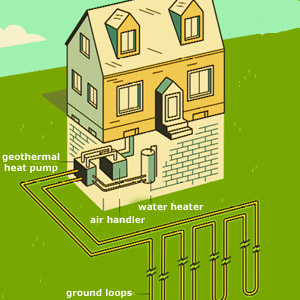The four major advantages of a geothermal heating and cooling system are: 1.) reduced heating and cooling costs; 2.) low life-cycle costs; 3.) positive environment impact; and 4.) potential Federal and State tax credits.
 A geothermal heat pump functions like a conventional heat pump, by using high-pressure refrigerant to capture and move heat between indoors and out. The difference is that conventional systems gather their heat—and get rid of it—through the outside air. By comparison, a geothermal heating and cooling system transfers heat through long loops of liquid-filled pipe buried in the ground.
A geothermal heat pump functions like a conventional heat pump, by using high-pressure refrigerant to capture and move heat between indoors and out. The difference is that conventional systems gather their heat—and get rid of it—through the outside air. By comparison, a geothermal heating and cooling system transfers heat through long loops of liquid-filled pipe buried in the ground.
Reduced Heating and Cooling Costs
Homeowners should realize a reduction of 30 to 70 percent in their overall heating and cooling costs with a geothermal heating and cooling system. Geothermal systems have the capability of capturing reclaimed heat during heating and cooling modes and using it to heat domestic water. This application can reduce the water heating cost of a four-person household by 50 to 60 percent. In the winter, the geothermal heating and cooling system pulls heat from the earth into the house or building and in the summer, the system removes heat from the house or building by dumping it into the ground.
Low Life-Cycle Costs
A study by the U.S. Environmental Protection Agency showed that geothermal systems have the lowest life-cycle cost of all heating and cooling systems currently on the market. Lower maintenance costs and longer life expectancy of geothermal units should certainly be taken into consideration when determining true savings. You can expect your geothermal system to provide an average of 20 to 24 years of reliable comfort and savings. In comparison, the average life cycle of a conventional system is 13 to 15 years.
Positive Environmental Impact
Furthermore, geothermal systems have a positive impact on the environment since they burn no fossil fuels and operate on a modest amount of electricity. According to the United States Department of Energy and the Environmental Protection Agency, geothermal systems are the most environmentally friendly way to heat and cool your home. They do not emit greenhouse gasses, which are known to contribute to environmental air pollution. Flammable fossil fuels are not used to operate geothermal units. Because there is no combustion, there is no chance of explosion, hazardous fumes or risk of carbon monoxide poisoning.
Tax Credits
The American Recovery and Reinvestment Act adopted in October 2008 allows for a 30% tax credit for costs associated with ENERGY STAR qualified geothermal heat pumps, as noted in section 25D of the Internal Revenue Code. The credit applies to geothermal equipment placed in service through December 31, 2016. The credit is equal to 30% of the total system cost.
Furthermore, HB 1186 (May 22, 2012) allowed Maryland to become the first state in the country to make the energy generated by GHC technologies eligible for the Renewable Portfolio Standard (RPS) as a Tier 1 renewable source. GHC system owners are also eligible for Renewable Energy Credits (RECs). See more here: Geothermal Heating and Cooling (Maryland Energy Administration).
In summary, there are some very significant advantage to geothermal heating and cooling systems. Cost savings alone can help offset what can be a high price to install this type of system. If you are interested in learning more about geothermal heating and cooling, please use the source links we provide below.
Sources:
http://www.geocomfort.com/about/geothermal-facts
http://energy.maryland.gov/renewable/geothermal.html
http://www.thisoldhouse.com/toh/article/0,,20162296,00.html
http://www.energystar.gov/products/certified-products/detail/heat-pumps-geothermal



I had no idea that geothermal systems were capable of lasting up to 24 years. Now that my wife and I have moved into our fixer-upper home, we would like to find a heating and cooling system that can compensate for the insufficient insulation in our attic. We’ll see if we can find a geothermal contractor that can help us find what we need.